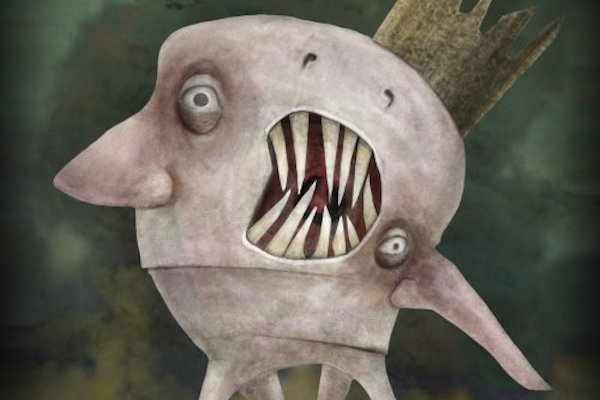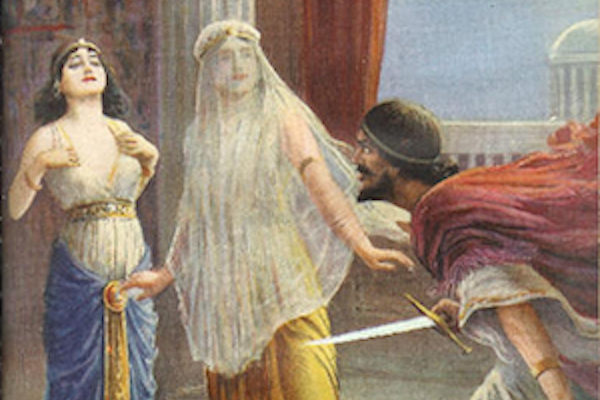Welcome back to Reading the Weird, in which we get girl cooties all over weird fiction, cosmic horror, and Lovecraftiana—from its historical roots through its most recent branches.
This week, we cover Karlo Yeager Rodriguez’s “Up in the Hills, She Dreams of Her Daughter Deep in the Ground,” first published in Strange Horizons in July 2023. Spoilers ahead!
“Not prone to daydreams or flights of fancy, Gloria was nevertheless afflicted by a peculiar dream: her belly grew round as if with child, only for an ají plant to sprout from her navel. Every night, her other dreams would fall away or transform, and she would find her belly swelling, stretch marks growing like stripes on her skin.”
Gloria and Pedro Villanueva live in the hills, in a jungle-surrounded concrete cube, far from San Juan’s student protests. Gloria’s family never considered sending her to university—marriage was her sole alternative to homebound spinsterhood. Her younger sister Eulalia swooned over Pedro; stealing him was part ticket out, part payback for Eulalia’s taunts.
Soon the novelty of marriage fades. Pedro drives to his pharmaceutical factory job; with no nearby neighbors, Gloria’s alone all day. A peculiar vision begins to dominate her dreams. She will notice her belly swelling as if with child, only for an aji plant to sprout from her navel and produce red peppers. The dream wakes her but never frightens her.
Eventually Pedro notices her sleep deprivation, and suggests they see Dr. Mendoza. Mendoza has impressive credentials, but Gloria doesn’t like how he addresses Pedro instead of her. Nevertheless, they sign consent papers for “insomnia tests.” A research grant will cover the costs.
Pedro only gets a half-day off, so he doesn’t stay with Gloria at Mendoza’s clinic. They argue, and part angrily. Hours later, Gloria wakes in pain, in a hospital bed, remembering little. She lifts her paper gown and sees “an angry red smile” cut below her navel. Mendoza’s removed her womb “with all the cold pragmatism of scraping seeds,” while Pedro’s been “too meek, too deferential” to prevent it, isn’t even with her to bear witness!
Back home, Pedro’s care rankles Gloria, but she’s too weak to refuse. She starts sleeping on the couch, ostensibly to be closer to the bathroom. In fact, her dream has returned.
One night she wakes at the jungle’s edge, where a tall aji plant bears blood-black peppers. A thin voice rises from its base. Gloria digs into the clay, faster as the voice grows clearer. Finally her fingertips brush a cold, pale cheek. She falls back on her butt. When the pain in her jarred abdomen fades, she peers into the hole, past thick roots, to a girl’s statue-pale profile. Gloria retreats to the house, but the girl’s voice follows: “Mama, don’t leave me.”
Next morning Gloria’s fingernails are dirt-caked. Pedro talks about getting a lawyer and suing Mendoza. She no longer cares about getting justice, nor does she want to appear a victim. Pedro doesn’t understand that “there are blows so devastating there was no hope of redress.” But she tells him just to make sure the lawyer works pro bono.
Another restless night finds Gloria curled around the hole, stroking the girl’s cheek as she begs “Stay, Mama. The bad dreams come when you go.” Once Gloria’s mother would stay with her to ward off nightmares. Then Eulalia came, and Gloria was expected to outgrow bad dreams, even as in the waking world “she was always walking in their shadows.” Gloria won’t abandon her daughter like that, and she is sure this girl is hers. She assures her she’s going nowhere, but asks when the girl can come to her. The girl says if uprooted, she’d wither. She takes Gloria’s hand in a cold grip that makes Gloria think she’ll be pulled into the hole, but then the grip softens to that of a “child surrendering to her mother’s guidance.”
She spends the next day dozing, housework neglected. Pedro insists on knowing what’s wrong. Gloria hates to talk about the girl, but who else can she tell? Pedro says, “Your—Our daughter?” Then he says the lawyer won’t take their case, since they signed Mendoza’s papers. Gloria’s previous fatalism dissolves into fury at the “look of superiority” on Pedro’s face. She calls him worthless, flings a cup, hoping he’ll fight things out with her. Instead he drives away.
Pedro begins staying away long hours, even overnight. Gloria suspects that like the men in her family, he’s keeping a mistress or a second family. She’s relieved. Every night she can curl around the aji and hold her daughter’s hand. Though nights are warm, she shivers as if the girl’s chill permeates her. Don’t leave me, the girl murmurs. Never, Gloria answers.
Buy the Book


The Dead Take the A Train
One night Pedro discovers Gloria at the aji. He smells of rum, and the girl shrinks from his flashlight’s glare. Who’s Gloria talking to, he demands, and probes the hole with his light. The girl keens. Gloria knocks away the flash—Pedro’s hurting her daughter!
Pedro drunkenly promises he’ll be a good father and starts digging the hole deeper, uprooting the aji. The girl writhes at exposure; oblivious, he resists Gloria’s restraint and snarls “How dare you hide my daughter from me?” He digs. He stops, wracked with laughter. Deep in the earth, beyond the girl’s pale face, Gloria sees something “dark and shriveled as a tangle of old roots.”
Nevertheless, the girl’s her daughter.
She clubs Pedro with his flashlight. He slumps into the hole, long enough for his quarry to “clamp her cold hands onto his cheeks and shriek her fury.” He staggers to his car and fishtails away.
Under the violated aji, Gloria finds only cold clay. No voice answers her calls.
Police officers arrive next morning. They inform her that Pedro missed a curve on the narrow road. She’s a widow, so young, but she can now wear widow’s black like armor. Pedro’s family resents her inheriting the house. Gossip blames her for Pedro’s accident. Jungle-cocooned, Gloria’s unruffled. She orders grocery delivery, and one day she receives aji peppers she didn’t order. Their mere presence feels like the sun’s warmth.
Gloria cuts open one pepper and scoops out white seeds. She takes them to the yard’s edge, where “the green shadows are deepest, to put them in the ground and hope.”
The Degenerate Dutch: The doctor only talks to Pedro, Gloria complains, never to her. But in fact it’s much worse than that, and sexism and racism both feed what he does to her.
Weirdbuilding: If both plants and children can be disturbing, what about plants that are also children?
Madness Takes Its Toll: Insomnia is not normally caused by prophetic dreams, but it’s as good a reason as any.
Ruthanna’s Commentary
The husband and wife, desperate for a child. The magical plant. The clear, constrained roles for each character. Fairy tales aren’t often considered a subgenre of horror, but only because we so rarely read the actual Grimm versions. Over recent decades, we’ve quietly pulled back toward those bloody roots: works like Gaiman’s “Snow, Glass, Apples” or McGuire’s Indexing link the Grimm’s bloody footprints with modern genre tropes.
Rodriguez says that “Up in the Hills” was inspired by Grimm not-so-classic “The Juniper Tree,” which is sorta kinda Snow White if Snow White were a dead boy, mixed with The Twa Sisters. In between all the beautiful birds bartering songs for instruments of revenge, the titular tree provides a much-longed-for child in exchange for the mother’s death.
Sometimes infertility is inexplicable: months can fade into years while a marriage remains barren. Gloria and Pedro never express the desire for a child, or indeed for each other, during those years. More than a child is missing. The first time Pedro acts to support Gloria, the result is infertility of a much more explicable sort. This is Rodriguez’s real-world—and more horrific—inspiration: “la operación”. A U.S.-funded eugenics campaign, only ending in the 70s, during which almost 30% of the women in Puerto Rico were given hysterectomies without consent. Such campaigns were not limited to Puerto Rico, either; I’m familiar with the domestic version from Marge Piercy’s Woman on the Edge of Time, whose Latina protagonist suffers the same violence.
It’s not clear whether Pedro suspects beforehand what’s going to happen, or simply lacks the courage to question the doctor about anything. But the end result is the loss of any potential for something to grow out of his and Gloria’s marriage. With more nuance than an actual fairy tale, this is not a simple case of Pedro being terrible. He never offers Gloria anything she needs or wants, but she never offers him any such thing, either, even to match his tentative overtures. She interprets his efforts to find a lawyer—possibly the most deliberate effort he makes—in the worst possible light. And we know that she “stole” him from her sister, who did love him, in an effort to get away from her family and get revenge on Eulalia. There are the twa sisters again.
When the dream of a pepper-plant pregnancy turns into the maybe-reality of a pepper-plant child, Gloria wants that child all to herself. Pedro’s reaction is a clumsy, angry, desire to share, to be father as she will be mother. Normally plant children grow into somewhat ordinary human-looking children, but this one has truly special needs. “If I could pull myself up out of the dirt, I would wither. You will have to come to me, Mamá.” And Gloria, whose own mother would stay with only one child at a time, comes to her.
There are hints that this child isn’t merely an unspoken wish come true. There’s something behind her human face, “dark and shriveled as a tangle of old roots,” and cold hands clasping Pedro’s face as she shrieks fury. With all the echoes back to murder ballads about sibling rivalry, I wonder what happened to Eulalia after—or before—Gloria stole Pedro from her. And whether she was buried under an Aji plant.
Gloria doesn’t want to see herself as a victim, and is ambivalent about demanding that the doctor be forced to pay for a crime beyond payment. Is that an echo? Is there an earlier point in her life at which she was perpetrator rather than victim? A point that makes her shy away from what might constitute payment?
And now she’s alone, a widow—with something else that she might need to pay for. And with a handful of aji seeds to plant.
Anne’s Commentary
What is it about horticultural horror that draws me like a shoggoth to giant albino penguins? A glance back in the Reading the Weird archives reminds me of two recent stories that I recommended we cover: Wendy N. Wagner’s “The Black Azalea” and C. L. Taylor’s “The Limb Garden.” Before those, I pushed John Langan’s “The Shallows,” in which one disturbing consequence of the Cthulhu apocalypse is how it screws up one’s garden produce. Hey, Outer Gods, leave them beans alone!
Without plants, we’re dead, which makes it natural to dread their loss. Not all plants are friendly, though. Some want to shred us with thorns or make us itch or even poison us. Then consider the gympie-gympie bush, which like so many Australian life forms is venomous, punishing the slightest touch with a neurotoxic injection producing pain so intense and persistent the gympie-gympie’s earned the nickname “suicide plant”—its sting makes killing oneself seem a good alternative to the suffering.
Gloria’s aji plant is no such monster. Capsicum frutescens, of the variety known as aji caballero or the gentleman’s chili, is an innocent little pepper native to Puerto Rico. Its sweet relative, Capsicum chinense or aji dulce, is more popular on the island—it’s a principal ingredient in many Puerto Rican dishes—but aji caballero graces tables in the vinegar-based hot sauce called pique. The genus Capsicum has many medicinal uses. I don’t know if aji caballero has any particular place in the herbalist’s pharmacopeia, say, as a fertility enhancer. It might appear in grimoires, however, as the very best host for a magical child—or something masquerading as one.
I tried to figure out the decade in which “Up in the Hills” takes place. Rodriguez drops a clue in the first paragraph: Gloria’s “sturdy country” relatives are shocked by the way university students are pelting police with rocks. Student protests in Puerto Rico aren’t confined to any one decade, but the March 6, 1970 edition of the New York Times reports on a violent confrontation in San Juan featuring much stone-throwing.
Gloria’s disastrous encounter with Dr. Mendoza supports a circa 1970 timeline. My search for a Mendoza involved in experimental malfeasance comes up blank. I did learn that in the 1950s U. S. pharmaceutical researchers used Puerto Rican women in oral contraceptive trials without informing them that they were trial subjects of an experimental drug. It’s suggestive that Pedro works in a pharmaceutical factory. That could explain how he knew of Dr. Mendoza, how he might have known that Mendoza was conducting research that could benefit Gloria. But benefit her as what, exactly, a depressive, a hysteric? Could Mendoza have been scouting for subjects at the factory? Is this why he and Pedro seem to share a “private joke” about treatment costs?
Still more nefarious than the contraceptive trials was a partnership between U.S. and Puerto Rican officials to solve the island’s economic problems by sterilizing its women. The specific targets were those working class women who doctors believed couldn’t handle the intricacies of contraception. “Working class” means stupid, I guess. Even illiterate. Mendoza has Gloria and Pedro sign paperwork, but he couldn’t have let them read the forms; by assuring them they only need make their “marks” for signature, he’s assuming neither can read.
Gloria doesn’t know she’s signed up for a hysterectomy. What about Pedro? Presumably he wants children. Or does he? If so, why does he drunkenly spew apologies and promises to be a good father when confronted with Gloria’s “daughter”?
No, Gloria doesn’t know how Mendoza meant to treat her “insomnia,” but when she wakes up post-surgery, she knows what the “angry red smile” of that sub-navel incision means. She’s undergone what so was so common among Puerto Rican women that it’s simply known as “La Operación.” Many recipients of “La Operación’s” benefits didn’t understand that they included the inability to have children. Gloria isn’t even given the chance to misunderstand. Hers is a blow “so devastating there was no hope for redress.” Not from the legal or medical systems, anyhow.
But—what about the fertile sprout of her dreams and the aji plant that appears on the edge of her jungle-encircled yard? What about its subterranean fruit, the earth-girl who calls Gloria Mama? Is this magic a divine intervention, or has Gloria unknowingly summoned a darker force with her suppressed ambitions and repressed furies? Gloria sees the girl’s fingers turn to claws as Pedro’s light drives her deeper into the hole. No, she thinks, it couldn’t be. Couldn’t be what? The something “dark and shriveled as a tangle of old roots” she later sees through the girl’s face? The disguise-stripped creature Pedro has killed by uprooting the aji.
It doesn’t matter. The earth-offering is Gloria’s own, her love, her daughter. Her way of living with the aftermath of devastating blows. When justice eludes, you take compensation where you find it.
And when aji seeds come to you unordered, whoever’s gift, you plant them.
Next week, the gang’s all here—sort of—in Chapters 9-10 of Max Gladstone’s Last Exit.
Ruthanna Emrys is the author of A Half-Built Garden and the Innsmouth Legacy series, including Winter Tide and Deep Roots. You can find some of her fiction, weird and otherwise, on Tor.com, most recently “The Word of Flesh and Soul.” Ruthanna is online on Twitter and Patreon and on Mastodon as [email protected], and offline in a mysterious manor house with her large, chaotic household—mostly mammalian—outside Washington DC.
Anne M. Pillsworth’s short story “The Madonna of the Abattoir” appears on Tor.com. Her young adult Mythos novel, Summoned, is available from Tor Teen along with sequel Fathomless. She lives in Edgewood, a Victorian trolley car suburb of Providence, Rhode Island, uncomfortably near Joseph Curwen’s underground laboratory.













